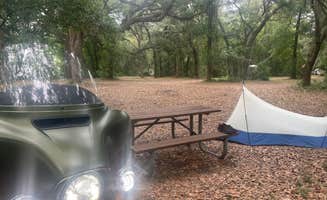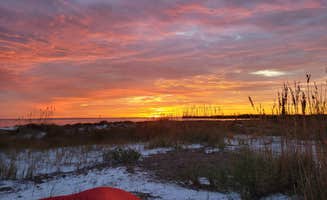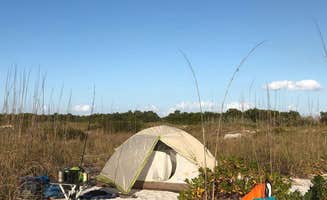Primitive camping near Temple Terrace, Florida requires careful preparation due to the subtropical climate that brings high humidity in summer months and cooler, drier conditions from November through April. The region sits within the Tampa Bay watershed, characterized by coastal lowlands and inland water management areas where seasonal flooding may affect campsite availability. Temperature variations between coastal and inland camping locations can exceed 10 degrees during winter months.
What to do
Wildlife observation: At Shell Key Preserve, campers regularly encounter diverse marine and bird species. "We saw sting rays, a baby turtle, many different birds and other wildlife within 5 minutes of parking the boat," reports one visitor. The preserve serves as a critical habitat for nesting shorebirds and sea turtles.
Island exploration: Paddling around the uninhabited islands at Anclote Key Preserve State Park Campground provides access to 11,000 acres of natural coastline. "We kayaked out from Anclote river park and stayed two nights on the island. During the day there were quite a few boats on the island but by about 4pm we basically had the island to ourselves," notes one camper. The 1887 lighthouse on the southern end occasionally offers ranger-led tours.
Fishing opportunities: The waterways surrounding Shell Key offer productive fishing. One visitor mentions, "Tons of edible flora, and fishing of course. Plus, shell key is one of the very few places you are allowed to have a fire on the beach in FL." Saltwater fishing licenses are required for all fishing activities in these preserves.
What campers like
Solitude and isolation: Many dispersed camping areas near Temple Terrace become remarkably quiet after sunset. At Upper Hillsborough Water Management Area, one camper noted, "Didn't run into anyone eventhough permit page indicated Booked out." This tranquility provides an uncommon wilderness experience within driving distance of urban areas.
Celestial views: The minimal light pollution at Anclote Key Preserve State Park Campground creates exceptional stargazing conditions. "It's worth every minute to see the sun rise and set in the same day, and the stars at night were endless," explains one visitor. The barrier island location provides unobstructed horizon views.
Accessibility by water: The journey to reach these primitive sites adds to their appeal. "We paddled from Ft Desoto (one on kayak, other on paddleboard) with all of our gear roped on," describes a Shell Key Preserve camper. The paddle distance from Fort DeSoto to Shell Key is approximately one mile, making it accessible for moderately experienced paddlers.
What you should know
Permit requirements: Most primitive camping areas require advance permits. Shell Key requires free camping permits from Pinellas County. Anclote Key permits must be secured online before arrival. Reservation systems vary by location with some sites showing as booked while actually remaining available.
Sanitation considerations: Complete absence of facilities requires preparation. "There are no bathroom facilities and all campers must bring a port-a-potty," explains one Shell Key visitor. Human waste disposal follows strict protocols at these preserves, typically requiring burial or complete removal depending on location.
Weather planning: Florida's coastal weather patterns significantly impact camping experiences. During summer, one Upper Hillsborough Water Management Area visitor advised, "We were the only ones there for the weekend, probably because of the summer heat." Wind conditions particularly affect island camping, with experienced campers recommending securing all gear against sudden gusts.
Tips for camping with families
Site selection: When camping with children, finding appropriate terrain becomes crucial. "You do need to be mindful that there are lots of plants, shrubs, sticks and stones which can make being in a tent pretty rough if you don't have a good pad and a tarp to protect your tent," advises a Shell Key camper. Searching for small sandy spots between vegetation provides more comfortable sleeping areas.
Transportation logistics: Consider equipment weight when planning family excursions to boat-access sites. One family noted, "Get your permit online. Park off the Pinellas Byway before you get to the DeSoto bridge, paddle between Summer Resort Key and Sister Key and you're there. One of the easiest island paddles out there - just a little over a mile." Distributing gear across multiple watercraft makes the journey manageable.
Environmental education: These primitive camping areas offer exceptional learning opportunities about coastal ecosystems. "Short boat ride out to what felt like a secluded island, back when florida was all natural," describes an Anclote Key visitor, highlighting the preserved nature of these areas compared to developed beaches.
Tips from RVers
Site accessibility: The limited primitive RV options near Temple Terrace require specific vehicle considerations. At Upper Hillsborough Water Management Area, one RVer shared, "Large open area with great shade trees, no water, privy. Easy pull through for RV." These sites accommodate smaller rigs but lack hookups or amenities.
Supplies planning: RVers must prepare for complete self-sufficiency. "The lack of trash cans was surprising. Just take your trash with you, leave no trace," advises one Upper Hillsborough camper. No sanitary dump stations exist at these primitive sites, requiring tank management planning for multi-day stays.
Seasonal considerations: Availability of shade affects RV camping comfort substantially in Florida's climate. Sites with mature trees provide natural cooling during warmer months, though some areas become exceptionally buggy during summer, particularly at dusk and dawn.




